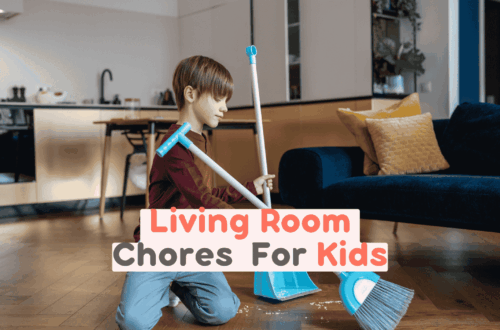Getting kids to do household chores can often feel like pulling teeth for many parents. The back-and-forth negotiations, the reminders, and sometimes, the outright refusals can quickly turn what should be simple tasks into stressful moments. However, integrating a bit of creativity can dramatically change this dynamic. One surprisingly effective way to transform chore time is by adding music. Yes, music! It has the power to energize, motivate, and even make chores an enjoyable part of your child’s day.
Music naturally uplifts moods, encourages movement, and creates a fun atmosphere — perfect for turning chores into a positive experience. This article will explore how music can make chores more fun for your kids, backed by research and practical tips to bring harmony (literally) to your household routine.
Ready to revolutionize chore time? Don’t forget to grab our free printable chore charts by age to get started with age-appropriate tasks that fit your child’s routine.
Why Music Matters When Kids Do Chores
Music isn’t just entertainment; it’s a psychological tool that stimulates the brain and influences behavior. According to a study published in the Journal of Music Therapy, music can reduce perceived effort and increase endurance during repetitive tasks, like chores. This means children might not only enjoy chores more but also keep going without feeling drained or bored.
According to a study published in the Journal of Music Therapy, music can reduce perceived effort and increase endurance during repetitive tasks, like chores. Research published in Frontiers in Psychology also found that rhythmic music enhances focus and coordination, helping kids stay engaged and complete chores more effectively.
On a more emotional level, playing upbeat tunes helps foster a positive mood, making chores feel less like a punishment and more like a family activity. This shift is crucial in building your child’s responsibility and independence around household tasks.
Music and Chores for Kids: Practical Tips to Make Cleaning Fun
- Create a Chore Playlist: Let your kids choose their favorite songs or genres to play while doing chores. This gives them a sense of control and makes the tasks more personalized.
- Set Chore Time to a Beat: Use upbeat, fast-tempo music to energize kids during activities like tidying toys or folding laundry. The rhythm can encourage quicker and more enthusiastic participation.
- Turn Chores Into a Dance-off: Making a game of it where kids have to dance or move to the beat while completing chores can turn mundane tasks into fun challenges.
- Use Music for Transition Times: Music can signal the start and end of chore sessions, helping kids to mentally prepare and structure their time.
- Incorporate Sing-alongs for Younger Kids: Singing along to familiar songs can keep young children engaged during tasks like sweeping or watering plants.
- Pair Music With a Chore Chart: Use chore charts as a tracking tool and reward kids with music time or singing breaks once tasks are completed.
- Experiment With Different Genres: Some children may respond better to classical music or instrumental tunes, which can also help concentration during quieter chores like organizing books or setting the table.
For more ideas on structuring chores according to your child’s age and capabilities, explore the comprehensive chores-by-age guide.
Want to get organized quickly? Download our free printable chore charts by age here to help maintain a fun and consistent routine.
Common Mistakes to Avoid When Using Music During Chore Time
- Playing Music Too Loud: While music can motivate, excessive volume might distract or overwhelm kids, reducing their ability to focus on tasks.
- Choosing Inappropriate Songs: Ensure the lyrics and themes are child-friendly and positive to avoid sending mixed messages or causing disruptions.
- Overusing Music as a Bribe: Music should enhance the chore experience, not be used solely as a reward, which might undermine intrinsic motivation.
- Ignoring Individual Preferences: Not all children respond the same way to music. Some may prefer silence or different types of auditory input, so remain flexible and observant.
Tracking Chores and Enhancing Motivation with the Kikaroo App
To make chore routines even more enjoyable and structured, consider using chore chart tools that integrate music and gamification elements. The Kikaroo app offers a digital chore tracker that motivates kids through rewards and progress tracking, helping to build responsibility and independence effectively. Its engaging interface can pair well with your music-enhanced chore sessions, turning household tasks into rewarding experiences.
Discover more about chore chart tools and apps by visiting this detailed guide.
Helpful Resources and Internal Articles
- Explore our tips to make chores easier for stress-free chore time filled with positivity.
- Learn effective methods for motivating kids to do chores without arguments, enhancing your music strategy further.
- Build a strong foundation by teaching responsibility through chores to foster long-term independence.
Conclusion
Incorporating music into your child’s chore routine is a simple yet powerful strategy to make responsibilities more enjoyable. Music uplifts moods, improves focus, and cultivates a positive atmosphere that encourages kids to take on tasks willingly. By pairing tunes with a clear system like a chore chart, you empower your child’s independence and responsibility without the usual nagging or arguments.
Ready to bring harmony to chores? Download our free printable chore charts and consider trying the Kikaroo app to keep motivation high and routines smooth. Turn chore time into fun time – one song at a time!
FAQ
Can music really help kids focus better on chores?
Yes, research shows rhythmic music can improve concentration and coordination, making it easier for kids to complete chores efficiently.
What type of music is best for chore time?
Upbeat, positive, and age-appropriate music tends to work best. However, preferences vary, so allow your child to choose what they enjoy most.
How often should I use music to encourage chores?
Using music regularly but not every single time is ideal. It keeps chore time fresh and prevents kids from relying solely on music as motivation.

 Home
Home Features
Features Testimonials
Testimonials Downloads
Downloads FAQ
FAQ Blog
Blog








